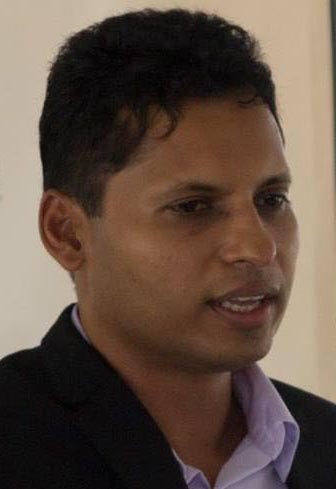Against the backdrop of what continues to be a less than convivial relationship between central government and the private sector, President of the manufacturers association Shyam Nokta used his Wednesday March 28th address to its Annual General Meeting to signal that concerns over lingering and serious impediments to the growth of the manufacturing sector notwithstanding, the GMSA was prepared to work with government to create an environment in which manufacturing can improve its contribution to both job-creation and exports.
From the Guyana Manufacturing and Services Association’s (GMSA’s) perspective, there remains a slew of barriers to local manufacturing, not least, Nokta told the AGM, ”tax measures, access to finance, market access and trade facilitation, procurement and high cost and unstable energy supply.” And while, amongst these, cheaper and more reliable electricity is likely to prove the most difficult mountain to climb, Nokta signaled that the GMSA is prepared to bring an end to what, over several years, has been a vacuous and often acrimonious discourse over the problems, by acknowledging the need “to engage with government and to do so through a strategic approach.”
Hence, since April last year, Nokta, said in his address, “the GMSA has had several engagements with government, principal among them through the Ministerial Roundtable with the Minister and Finance and team (that includes at least three other Cabinet-level Ministers) and which adopted a sector by sector focus with the first sector being Forestry and Woodworking. In April, the second roundtable will convene, with a focus on agro-processing.”
An earlier briefing by immediate past President of the GMSA, Ramsey Ali had talked up the results-oriented nature of the Roundtable forum, embracing the customary absence of bureaucratic clutter and lack of any mutually satisfying outcome, that so often characterizes public/private sector engagements. Ally had told the Stabroek Business that the GMSA had been persuaded that the Roundtable, rather than a manifestation of what in the past had been exercises in simply going-through-the-motions had shown clear signs – on the parts of the Ministers involved – to take the process forward. The Roundtable, Nokta declared in his address to the GMSA’s AGM “provided an opportunity for the GMSA to offer a comprehensive overview of the sector, pointing out challenges and offering recommendations for intervention.” Arising out of this unmistakable optimism, Nokta said, “a Joint Technical Working Group was set up to advance the discussions.”
He went further. Historically, and across political administrations, charges have continually arisen over what the private sector has labelled that meaninglessness of pre-budget consultations in circumstances where, they have argued, the views and concerns of the private sector are customarily excluded from the Finance Minister’s presentation. Consultations this time around, Nokta said, embraced issues such as taxation, public procurement and energy as well as ‘sector-specific measures covering key sectors such as forestry and wood processing, agro-processing services, among others.” And while his presentation stopped well short of giving unqualified approval to the extent to which the GMSA’s concerns were addressed in the budget presentation, Nokta departed from what, in the past has been, at times, a blanket criticism of the Finance Minister’s final presentation, asserting that the GMSA was “pleased that several measures that were advocated for the forestry and wood-processing sector have been adopted…………..These measures,” he said, “include the exemption of VAT on logs and rough lumber; budgetary allocation of $120 million to commence a national forest inventory; budgetary allocation of $50 million to partner with the private sector to establish a consolidated/dimensioned stockyard.” And while he expressed the view that “taxation, incentives and the cost and reliability of energy supply” remained serious impediments to the viability of the forestry and wood-processing sector and the manufacturing sector as a whole, Nokta appeared to be in no doubt about the desirability of persisting with the public/private sector high level engagement.
Beyond the high level engagement, the Nokta presentation alluded to what he described as “other key initiatives” undertaken by the GMSA, each of which, significantly, involved varying levels of public/private sector partnership. He alluded to UncappeD, an ongoing initiative launched by the GMSA and the Ministry of Business in October and which is designed to, over time, create an enhanced environment for maximizing both the manufacture of agro-produce and facilitating a stronger presence for such produce on the local and external markets; public/private sector discussion fora that allowed for interface with key state agencies including the Guyana Revenue Authority, the Guyana Office for Investment and the Government Analyst-Food and Drugs Department. These fora, according to Nokta, “provided a valuable opportunity for clarifying affecting members” and helped “to foster a collaborative relationship with key (state) agencies.”
The GMSA, Nokta pointed out, had, over the past year, been involved in various “key national activities” including last June’s EPA-staged Green Business Forum, the Private Sector Commission Business Summit, geared, he said, towards “bringing perspectives on business development and arriving at a road map of actions to stimulate economy growth and address key barriers to issues.” The October Summit, Nokta, asserted, “was able to bring together government and the opposition and facilitated participation from a national and international audience….”





